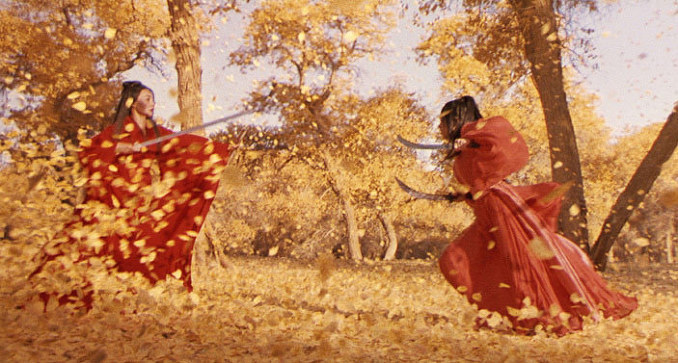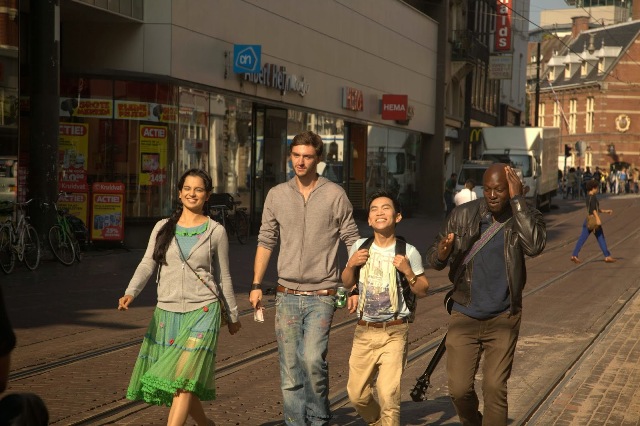In ancient China, there is a saying that, “A woman who lacks talent is virtuous”, whilst, the Bible also tells us that,”Wives, be in subjection unto your own husbands, as unto the Lord.” (Ephesians 5:22), where this scripture was originated from Israel, the Middle East Asia. These two phases shared a similar meaning of, women should be acting as an assistant role at home, and also in society. However, after many centuries, had this value of gender role changed in Asia, especially the two most populous countries in the world, China and India?
Hero (2002) a Chinese film that directed by famous director Yimou Zhang, which is portraying the value of the contemporary China that, although it is still a patriarchal society, young women could be the master of their own life, and owned the freedom to choose their partner (Chen, 2004). In the film, there are two female characters, Flying Snow, a skilled assassin who lost her father, and Moon, an orphan who was the apprentice of Flying Snow’s lover, that both of them got relief from the patriarchy. In Chen’s book, Yimou Zhang stated that, the usage of women in this film, was to convey the injustice and repression that the Chinese people had undergone through these thousands of years, it was impressive that women always suffered more than men (Chen, 2012). Moreover, women in this film were also acting a heroic figure and a role model to female spectators, showing them that women should also firmly stand and fight for what they believe in, and do not resign only because of their gender and social role.

Flying Snow and Moon are having a sword-fight for who they loved cr. Hero
Similarly, gender inequality is also a serious issue in the Indian society, that they had been taught to comply with men in their family, which could be told from the opening of the woman-lead Indian film, Queen (2014), that the female protagonist Rani, was requesting for her father’s permission to start her solus honeymoon trip. In Queen, there’s also two female characters Vijayalakshmi (a hotel maid) and Roxette (a call girl), who’s acting as the opposite of Indian’s traditional value, an independent woman that takes control of her own life, her own body and fights for what she believes in, which had eventually shaped Rani’s understanding of how a woman should be in the modern world (Gupta, 2015). As well as, it is thought-provoking that what kind of images the three Rani’s hostel friends, the three guys from different countries were represented, which were rarely being supporting roles in the film that backing Rani at all time, and respecting all her actions and decisions, that performing in contrast with men’s role in Asian films.

Three men who always supporting Rani, acting the opposite of the Indian traditional mindset Cr. Queen
These two Asian films had noticed us that how the gender role had continuously been shaped these days, in the wake of the ever-moving value in the 21th century that, in Asia, women could one day share the same right as men has, and the boundaries between gender is progressively being blurred.
(492 words)
Reference
Bahl, V. (Director). (2014). Queen [Film]. India: Viacom 18 Motion Pictures.
Chen, X. (2004). On the Father Figures in Zhang Yimou’s Films: From Red Sorghum to Hero. Asian Cinema. Vol. 15, No 2 (Fall/ Winter 2004) pp. 133-140
Chen, Y. (2012). To (En) gender the Gendered History in Hero. Women in Chinese Martial Arts Films of the New Millennium Narrative Analyses and Gender Politics (pp. 59-73). Lanham: Lexington Books.
Gupta, S. (2015) Kahaani, Gulaab Gang and Queen: Remaking the queens of Bollywood, South Asian Popular Culture, 13:2, 107-123, DOI: 10.1080/14746689.2015.1087107
Zhang, Y. (Producer & Director). (2002). Hero [Film]. China: Miramax.
Commented on


Hi Yee Nok,
I really liked the context you provide with the two passages at the beginning, and how gender traditions may have been established specifically in Asia.
You commented that these women experienced freedom from the patriarchy with regard to choosing their own romantic partners, however Flying Snow and Broken Sword’s relationship was effectively torn apart, as a result of Broken Sword’s actions when they seized the palace and he spared the Emperor. While Flying Snow is a woman who operates out of her personal convictions, the need to avenge her father is a driving force in her life. There are also analyses of this film which suggest that the Emperor symbolises a father figure, consistent with the father/son dynamic portrayed in several other of Zhang’s films. While these two character’s actions are so heavily influenced by father figures, to the detriment of their relationship, could it be argued patriarchy is a driving force in this film which the characters are bound by? Or would you say that Flying Snow’s personal choice to avenge her father and to kill Broken Sword are unrelated to the portrayal of fatherhood in the film?
Hi Sarah,
Thanks for your comment! You are right, the Emperor Qin could also act as a father figure even though he doesn’t have a biological relationship within anyone in the film, and he’s the person who causes their love relationship being torn apart, however, I would not say Flying Snow’s revenge was driven by patriarchy. Let’s imagine if Flying Snow’s mother was being killed by the Emperor instead of her father, I guess her personal conviction and her intention of being a assassin would still be the same. As well as, I think the main reason that Broke Sword did’t kill the Emperor would be his belief of putting the whole world (Tianxia) at the first place, instead of his personal affairs.
Yee Nok